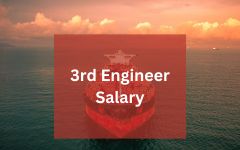Second Engineer Salary: What You Need to Know
Marine engineering is an exciting and challenging field that involves designing, building, and maintaining ships and other marine structures. As a marine engineer, you can work on a wide range of vessels, from cargo ships and oil tankers to cruise liners and naval vessels. One of the most important roles in marine engineering is that of the second engineer (or in other words 2nd engineer), who is responsible for keeping the ship's mechanical and electrical systems running smoothly.
Let's check some numbers, facts, and statistics about the second engineer salary (2nd Engineer Salary).
What Does a 2nd Engineer Do?
As mentioned earlier, a marine second engineer is responsible for maintaining and repairing a ship's mechanical and electrical systems. However, this is just the tip of the iceberg when it comes to the range of duties and responsibilities that second engineers have. Let's take a closer look at some of the key tasks that a marine second engineer performs and how they can impact their salary.
Ensuring Proper Operation and Maintenance of Equipment
Ensuring proper operation and maintenance of equipment is essential for marine second engineers to perform their jobs effectively and safely. Proper maintenance of equipment can also extend the lifespan of the equipment, reduce the risk of costly breakdowns, and increase the safety of the crew and the vessel.
The first step in ensuring proper operation and maintenance of equipment is to establish a routine maintenance schedule. This schedule should include regular inspections, maintenance, and repairs of all equipment on the vessel, including engines, electrical systems, HVAC systems, and safety equipment. The maintenance schedule should be based on the manufacturer's recommendations, industry standards, and the specific needs of the vessel and its equipment.
In addition to regular maintenance, marine second engineers should also be vigilant about identifying potential problems and addressing them before they become serious. This can include monitoring equipment performance, inspecting equipment for signs of wear or damage, and identifying any unusual sounds, smells, or vibrations that may indicate a problem.
Proper operation of equipment is also critical for ensuring safety and efficiency. Marine second engineers should be trained to operate all equipment according to manufacturer's specifications, industry standards, and safety regulations. This includes proper startup and shutdown procedures, monitoring equipment performance during operation, and following established protocols for emergency situations.
Proper storage and handling of equipment is also important for ensuring its longevity and performance. This includes storing equipment in a dry and clean environment, protecting it from corrosion and damage, and following manufacturer's recommendations for storage and handling.
Finally, effective communication is critical for ensuring proper operation and maintenance of equipment. Marine second engineers should communicate regularly with other members of the crew and with shore-based support teams to ensure that everyone is aware of any equipment issues, maintenance schedules, or safety concerns. This can help to prevent misunderstandings and ensure that everyone is working together to maintain a safe and efficient vessel.
Managing Fuel or Oil Systems & Second Engineer Salary
Managing fuel and oil systems is a critical responsibility for marine second engineers. These systems are essential for the operation of the vessel, and proper management is essential for ensuring safety, efficiency, and compliance with environmental regulations.
The first step in managing fuel and oil systems is to establish a routine maintenance schedule. This schedule should include regular inspections, testing, and cleaning of all fuel and oil systems on the vessel. This will help to identify potential problems and address them before they become serious, reducing the risk of costly breakdowns or safety issues.
In addition to regular maintenance, marine second engineers should also be vigilant about monitoring fuel and oil consumption and quality. This includes monitoring fuel and oil levels, temperature, and pressure, and checking for signs of contamination or degradation. Any issues should be addressed promptly to avoid damage to the equipment or risks to crew safety.
Proper handling and storage of fuel and oil are also critical for ensuring their quality and safety. Marine second engineers should follow established protocols for handling and transferring fuel and oil, including proper storage, labeling, and transfer procedures. This can help to prevent spills, leaks, and other accidents that could cause environmental damage or endanger crew members.
Compliance with environmental regulations is also essential when managing fuel and oil systems. Marine second engineers should be aware of local and international regulations governing the disposal and discharge of fuel and oil, and ensure that their practices comply with these regulations. This includes properly disposing of used oil and filters, and ensuring that discharge of bilge water and other waste materials meets regulatory requirements.
Effective communication is also critical for managing fuel and oil systems. Marine second engineers should communicate regularly with other members of the crew and with shore-based support teams to ensure that everyone is aware of any fuel and oil issues, maintenance schedules, or safety concerns. This can help to prevent misunderstandings and ensure that everyone is working together to maintain a safe and efficient vessel.
Overseeing Junior Engineering Staff & Second Engineer Salary
Overseeing junior engineering staff is an important responsibility for marine second engineers. Junior engineering staff includes engine cadets, ratings, and other technical personnel who work under the guidance and supervision of the marine second engineer. Effective management of junior engineering staff is critical for ensuring the safe and efficient operation of the vessel.
The first step in overseeing junior engineering staff is to establish clear roles and responsibilities. Junior engineering staff should be given specific tasks and responsibilities that are appropriate to their level of training and experience. This will help to ensure that everyone on the team understands their role and knows what is expected of them.
Training and mentoring are also important for managing junior engineering staff. Marine second engineers should provide training and guidance to junior engineering staff, including instruction on equipment operation, maintenance, and repair, as well as safety procedures and emergency response protocols. Mentoring can also help to develop the skills and knowledge of junior engineering staff and prepare them for future roles and responsibilities.
Effective communication is also critical when overseeing junior engineering staff. Marine second engineers should communicate regularly with junior engineering staff to ensure that everyone is aware of any issues or concerns, and to provide guidance and feedback as needed. This can help to prevent misunderstandings and ensure that everyone is working together to maintain a safe and efficient vessel.
Performance management is another important aspect of overseeing junior engineering staff. Marine second engineers should establish clear performance standards and provide regular feedback to junior engineering staff on their performance. This can include regular evaluations, coaching, and mentoring, as well as recognition and rewards for good performance.
Effective leadership is also important when overseeing junior engineering staff. Marine second engineers should lead by example and set a positive tone for the team. This can include demonstrating a strong work ethic, being responsive to crew members' concerns, and fostering a culture of safety and teamwork.
Maintaining Accurate Records & Second Engineer Salary
Maintaining accurate records is an essential responsibility for marine second engineers. Accurate records are critical for ensuring the safe and efficient operation of the vessel, complying with regulatory requirements, and supporting effective decision-making. Marine second engineers are responsible for maintaining a wide range of records related to vessel operations, maintenance, safety, and crew management.
One of the most important types of records that marine second engineers must maintain is maintenance records. These records should include detailed information on all maintenance and repair work performed on the vessel, including the type of work performed, the date, and the name of the person or company that performed the work. This information is critical for tracking the condition of the vessel, identifying potential problems, and ensuring that maintenance is performed in a timely and effective manner.
Another important type of record that marine second engineers must maintain is safety records. These records should include information on safety drills, safety equipment inspections, and any safety incidents or accidents that occur on board the vessel. Maintaining accurate safety records is critical for identifying potential safety hazards, tracking safety performance, and ensuring that the vessel is in compliance with safety regulations.
Crew management records are also important for marine second engineers to maintain. These records should include information on crew members' training, certification, and performance. Crew management records are critical for ensuring that crew members are properly trained and qualified to perform their jobs, and that their performance meets the requirements of the vessel's operating standards.
Environmental records are another important type of record that marine second engineers must maintain. These records should include information on the vessel's environmental impact, including fuel and oil consumption, emissions, and waste management practices. Maintaining accurate environmental records is critical for complying with environmental regulations, identifying areas for improvement, and demonstrating the vessel's environmental performance to regulators and stakeholders.
In addition to these types of records, marine second engineers must also maintain records related to navigation, communications, and cargo operations. Accurate and up-to-date records in these areas are critical for ensuring the safe and efficient operation of the vessel and complying with regulatory requirements.
The Impact of Duties on Second Engineer Salary
The impact of duties on salary is an important consideration for marine second engineers. Duties refer to the specific tasks and responsibilities that are assigned to marine second engineers, and can have a significant impact on their salary.
Marine second engineers who are responsible for more complex and technical duties, such as overseeing major repairs or managing the vessel's propulsion system, may command a higher salary than those who perform more routine duties, such as basic maintenance or record-keeping. Additionally, marine second engineers who have experience in a specific area, such as marine electronics or diesel engine maintenance, may be in greater demand and command a higher salary as a result.
Another factor that can impact salary is the level of responsibility that comes with the duties assigned to the marine second engineer. For example, marine second engineers who are responsible for overseeing a larger crew or managing complex systems may command a higher salary than those who have less responsibility.
The location and type of vessel can also impact the salary of marine second engineers. Vessels that operate in more challenging environments, such as the open ocean or in extreme weather conditions, may require marine second engineers with specialized skills and experience, and may offer higher salaries to attract qualified candidates. Similarly, vessels that carry hazardous or specialized cargoes may require marine second engineers with additional training and experience, which can also impact salary.
Experience is another important factor that can impact the salary of marine second engineers. Those who have a greater level of experience, such as those who have worked in the industry for many years, may command a higher salary than those who are newer to the industry. This is because experienced marine second engineers are often able to perform their duties more efficiently and effectively, and may require less training and supervision.
Range of Second Engineer Salary
The salary range for marine second engineers can vary greatly depending on a number of factors, including the individual's level of experience, the type of vessel they work on, and their qualifications and certifications. Generally speaking, second engineers can expect to earn a competitive salary that is commensurate with their level of expertise and responsibility.
According to industry data, the average salary for a marine second engineer in the United States ranges from $70,000 to $110,000 per year. However, this figure can vary depending on a variety of factors, including the size and type of vessel, the location of the vessel, and the individual's level of experience and qualifications.
For example, second engineers who work on larger vessels or in specialized areas of marine engineering, such as electrical systems or fuel management, may be able to command higher salaries than those who work on smaller vessels or have more general skills. Additionally, those who have advanced certifications and training, such as a Chief Engineer License or specialized training in advanced propulsion systems, may also earn higher salaries.
Other factors that can influence a marine second engineer's salary include the location of the vessel and the experience level of the individual. Second engineers who work in high-cost regions, such as New York or California, may earn higher salaries to compensate for the higher cost of living in those areas. Additionally, second engineers who have several years of experience in the industry may be able to negotiate higher salaries than those who are just starting out in their careers.
It's important to note that while the average salary range for marine second engineers is relatively high compared to other industries, the job can also be demanding and often requires long hours and extended periods away from home. Many second engineers work on a rotation schedule, which can involve several weeks or even months at sea followed by an equal amount of time on land. While this can be challenging, it can also be rewarding for those who enjoy working in a dynamic and challenging environment.
How Can You Increase Your Second Engineer Salary?
Second engineer salary (2nd engineer salary) increase? Let's discuss a few ideas below.
For marine second engineers looking to increase their salary, there are several strategies that they can employ. These include gaining additional certifications and training, building strong professional relationships, and seeking out job opportunities on larger vessels or in specialized areas of marine engineering.
One of the most effective ways to increase your marine second engineer salary is to gain additional certifications and training. For example, obtaining a Chief Engineer License or specialized training in advanced propulsion systems can make you more valuable to employers and enable you to command a higher salary. Additionally, staying up-to-date with the latest technologies and advancements in marine engineering can also demonstrate your expertise and make you more attractive to employers.
Building strong professional relationships is also critical for increasing your marine second engineer salary. This can include networking with other professionals in the industry, attending industry conferences and events, and seeking out mentorship opportunities from more experienced professionals. These relationships can not only help you learn new skills and gain valuable insights into the industry, but can also provide you with leads on job opportunities and potential employers.
Seeking out job opportunities on larger vessels or in specialized areas of marine engineering can also be a key strategy for increasing your salary as a marine second engineer. Larger vessels typically require more advanced skills and expertise, and therefore may offer higher salaries to attract top talent. Additionally, seeking out opportunities in specialized areas of marine engineering, such as electrical systems or fuel management, can also make you more valuable to employers and enable you to command a higher salary.
Finally, it's important to remember that as with any job, negotiation skills are key when it comes to salary. Before accepting a new job or seeking a raise, it's important to do your research and understand the industry standards for your position and level of experience. Additionally, it can be helpful to have a clear understanding of your own value and the unique skills and expertise that you bring to the table.
Job Prospects & Second Engineer Salary
The job prospects for marine second engineers are generally positive, with a growing demand for skilled professionals in the marine engineering industry. As global shipping continues to expand, the need for qualified marine second engineers is expected to grow, particularly in emerging markets such as Asia and South America.
In addition to opportunities in traditional shipping industries, marine second engineers may also find employment in other areas of the maritime sector, including offshore oil and gas exploration, marine renewable energy, and marine research and development. These industries are expected to see significant growth in the coming years, driven in part by increasing demand for sustainable energy and environmental protection.
Another factor driving job growth for marine second engineers is the increasing complexity of modern vessels and marine systems. As ships become more advanced and sophisticated, the need for skilled engineers to design, build, and maintain these systems will continue to grow. Additionally, the rise of autonomous shipping technology is expected to create new job opportunities for marine engineers with expertise in artificial intelligence and related fields.
In terms of salary, marine second engineers can expect to earn competitive salaries that reflect the specialized skills and expertise required for their position. While salaries can vary depending on a number of factors, including experience level, location, and the type of vessel or industry they work in, marine second engineers can generally expect to earn salaries that are above average compared to other industries.






